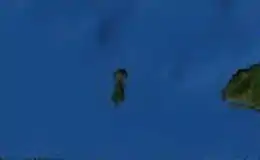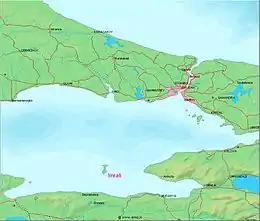İmralı
İmralı is a small Turkish prison island in the south of the Sea of Marmara, west of the Armutlu-Bozburun peninsula within Bursa Province. It measures 8 kilometres (5 miles) in the north-south direction with a width of 3 kilometres (2 miles), and has an area of 9.98 square kilometres (3.85 sq mi). The highest peak is Türk Tepesi at an altitude of 217 metres (712 feet) above sea level. It is prohibited to fly over it or fish near its shores.
 Satellite image of İmrali island in Turkey. | |
 | |
| Geography | |
|---|---|
| Location | Sea of Marmara |
| Coordinates | 40°32′15″N 28°32′06″E |
| Area | 9.98 km2 (3.85 sq mi) |
| Coastline | 19.4 km (12.05 mi) |
| Highest elevation | 217 m (712 ft) |
| Highest point | Türk Tepesi |
| Administration | |
Turkey | |
| Region | Marmara Region |
| Province | Bursa Province |
History
The Roman authors Pliny the Elder and Strabo called the island Besbicus (Ancient Greek: Βέσβικος).[1] It was later known as Kalonymos (Greek: Καλώνυμος) and Kalolimnos (Greek: Καλόλιμνος). In antiquity, it was a member of the Delian League since it appears in tribute records of Athens between 434/3 and 418/7 BCE.[2]
The Turkish name İmralı derives from the name of the island's conqueror, Emir Ali, one of the first Ottoman admirals. In 1308 İmralı became the first island to be conquered by the newly established Ottoman Navy. Its strategic location enabled the Ottomans to control the movement of ships in the Sea of Marmara with a naval base established on it, cutting the Byzantine Empire's connection to Bursa.
In 1913 the island had 250 houses, a school, three monasteries, and 1,200 residents, all of whom were Greeks. The economic activity of the island's residents consisted mainly of fishing and farming onions, with most of the grown onions sold to Istanbul. There were three Greek villages on the island until the Turkish War of Independence (1919–1923), engaged mostly in growing grapes, winemaking, silk production and fishing. The island was mostly uninhabited from the 1923 population exchange between Greece and Turkey until 1935, when a semi-open category prison was built. The prisoners earned money by working in agriculture and fishing.
One well-known islander was Kimon Friar who emigrated to the United States and became a scholar and translator of Greek language poetry.[3]
There is a military base on the island, and the area around the island is a forbidden zone. It served from 1999 until 2009 as a maximum-security prison island for its only inmate, Abdullah Öcalan the leader of the PKK. The other prisoners on the island were transferred elsewhere so that Öcalan was the island's sole prisoner. In November 2009, several other prisoners were transferred to a newly-constructed building on the island, where Öcalan is incarcerated.
Notable inmates of the prison
| Name | Criminal charge | Period in İmralı | Notes | Ref. |
|---|---|---|---|---|
| Yılmaz Güney | "Helping the revolutionaries" | 1972–1974 | [4][5] | |
| Billy Hayes | Drug smuggling | 11 July 1975–2 October 1975 | American author who wrote the book Midnight Express and was the subject of "Locked Up Abroad: The Real Midnight Express". He was serving a life sentence until his escape. | [6] |
| Abdullah Öcalan | Treason and separatism | 1999–present | Founder of the Kurdistan Workers' Party (PKK). Serving a life sentence since 1999 (his death sentence was commuted). | [7] |
| Şeyhmus Poyraz | Treason | 2009–present | Member of the Kurdistan Workers' Party (PKK). Serving a life sentence. | [8] |
| Cumali Karasu | Treason and terrorism | 2009–present | Member of the Kurdistan Workers' Party (PKK) and perpetrator of a bombing in Tuzla on 12 February 1994 which killed 5 people and injured 27 others. Serving a life sentence. | [8] |
| Bayram Kaymaz | Treason | 2009–present | Member of the Kurdistan Workers' Party (PKK). Serving a life sentence. | [8] |
| Hasbi Aydemir | Treason | 2009–present | Member of the Kurdistan Workers' Party (PKK). He was captured in 1998 in an ambush against Turkish security forces in Bingöl. Serving a life sentence. | [8] |
| Hakkı Altan | Treason | 2009–present | Member of the Communist Party of Turkey/Marxist–Leninist. He was captured in 1999. | [8] |
References
- Sir William Smith, ed. Dictionary of Greek and Roman Geography, vol. 1 (London: John Murray, 1872) p. 395.
- Mogens Herman Hansen & Thomas Heine Nielsen (2004). An inventory of archaic and classical poleis. New York: Oxford University Press. p. 978. ISBN 0-19-814099-1.
- American College of Greece Archived 2007-10-13 at the Wayback Machine
- "Yılmaz Güney İmralı'da neden yattı? Çirkin Kral'ın İmralı günleri" (in Turkish). Retrieved 2020-11-01.
- "YOL – The Full Version (Der Weg | The Way | La permission, 2017) – DFK FILMS" (in German). Retrieved 2019-05-28.
- Interview on YouTube
- "Ocalan sentenced to death", theguardian.com, June 29, 1999, retrieved December 21, 2020
- "Öcalan'ın İmralı'dan gönderilmesini istediği 5 mahkûmun isimleri". T24 (in Turkish). Retrieved 2020-11-01.
Sources
- (in Turkish) Brief history
- (in Turkish) On the island
- (in Turkish) Brief history
- (in Turkish) About the name of the island